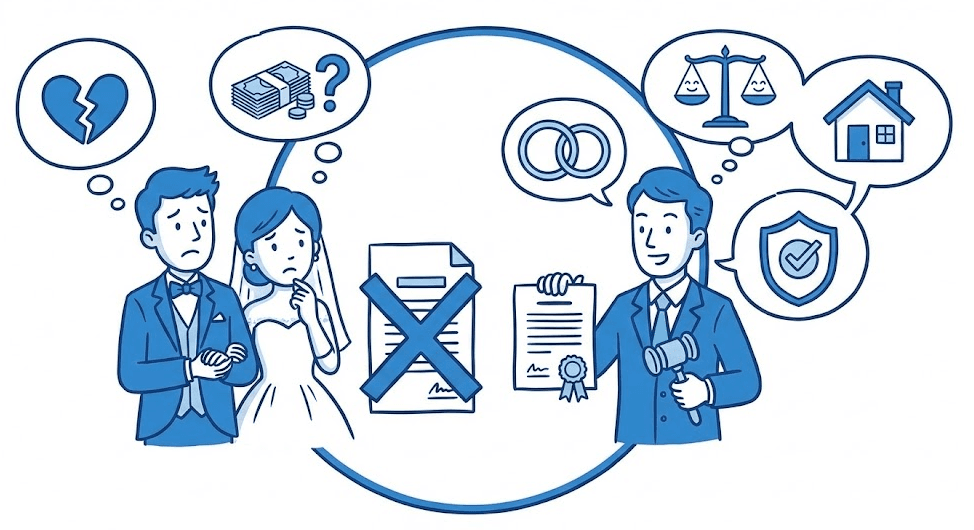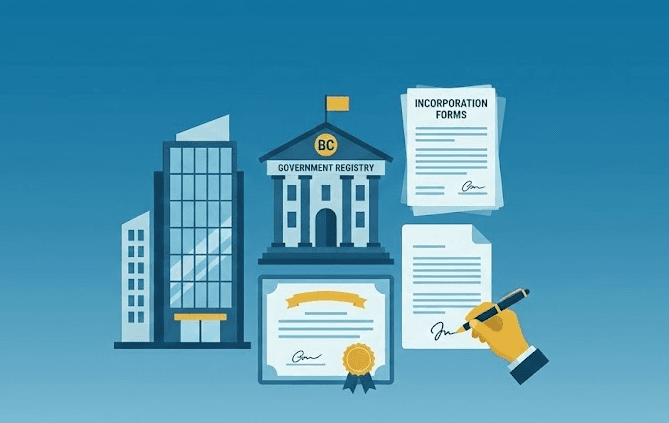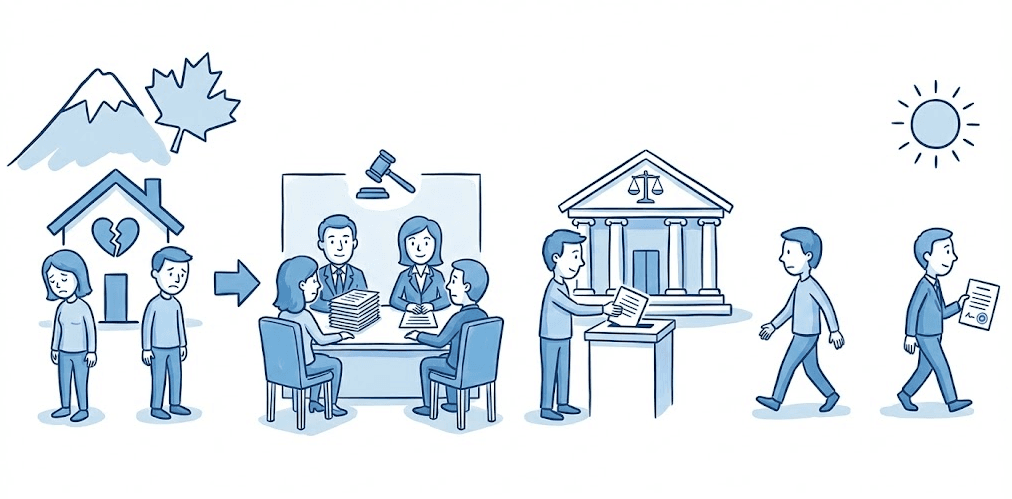
Legal Insights & Articles
Expert-written articles on various legal topics to help you navigate complex legal matters. Stay informed with our in-depth analyses, practical guides, and insightful perspectives.


Common Client Misconceptions (Prenuptial Agreements)
Understanding the realities versus common misconceptions about prenuptial agreements in British Columbia. This article clarifies 8 crucial areas including children from previous relationships, property appreciation, foreign assets, income disclosure, spousal support waivers, family homes, gifts and inheritances, and the enforceability of agreements.
Adele Sun
Barrister & Solicitor

Understanding the Corporate Veil: Protection and Pitfalls
One of the biggest perks of incorporation is limited liability—known as the "corporate veil." But is this protection absolute? This guide explores the legal foundations from Salomon v. Salomon, explains how the veil protects shareholders, and reveals the specific circumstances where courts might "pierce" it to hold owners personally liable.
Kun Dong
Articling Student

Understanding Business Acquisitions: What Buyers and Sellers Need to Know
Buying or selling a business is a major milestone. Whether structuring a deal as a share purchase or asset purchase, understanding the legal landscape is crucial. This guide covers key considerations including Letters of Intent (LOI), purchase agreements, due diligence, and regulatory approvals to help ensure a smooth transaction.
Kun Dong
Articling Student

Incorporating a Company in British Columbia: A Practical Guide
Starting a business is a significant milestone. Incorporation provides vital legal and financial advantages by creating a separate legal entity to limit personal liability. This guide outlines the essential steps to incorporating in BC, from name reservation and preparing corporate articles to setting up your registered office and structuring shares.
Kun Dong
Articling Student

Choosing the Right Business Structure in Canada: A Practical Guide for Entrepreneurs
Starting a business is exciting — but choosing the right legal structure is one of the most important decisions you’ll make. The structure affects taxation, liability, governance, and long-term growth. At Avid Law Corporation, we help entrepreneurs build a strong legal foundation from day one. This guide explores Sole Proprietorships, Partnerships, and Corporations to help you decide.
Kun Dong
Articling Student

Foreclosure in British Columbia: What Homeowners and Lenders Need to Know
Foreclosure is a legal process that allows a mortgage lender to recover money owed when a borrower falls behind on payments. In British Columbia, foreclosure is court-supervised and must go through the BC Supreme Court.
Kun Dong
Articling Student

A Practical Guide to the Divorce Filing Process and Procedures in British Columbia
When we mention the word “divorce”, the first thing that comes to your mind may be a friend who is disillusioned with love. Happy people are always similar, while unfortunate people have their own misfortunes. After the divorce, even if he can not talk about the soul, but the frozen property, by the other party to take away the children; was forced to share half of the house, as well as that a glimpse of the endless alimony, this usually optimistic friend can not help but more anxious frown a few points. Nowadays, with the explosion of information on the Internet, the word “divorce” is slowly losing its dramatic veil, and people are beginning to be more curious about the law behind divorce. This series will lead you to analyze divorce in Vancouver from the perspective of a professional lawyer. However, please note that this article is only intended to provide you with legal knowledge and is not intended to be a legal opinion on behalf of a lawyer. Every family's situation is not similar, so please call us if you have any questions. Characteristics of Family Litigation In recent years, due to the influence of various TV shows, when the word “litigation” is mentioned, it seems as if a lawyer in a suit appears in front of everyone's eyes, talking in a courtroom. The trial has its ups and downs, and in the end, the lawyer wins the case with his wits and cries tears of joy with his client. The losing party, on the other hand, beats his chest in remorse.
Avid Law
Legal Specialist

Navigating Asset Division: Understanding Property Rights During a Divorce in BC
As the saying goes, family is always there for us, and we all need the help of our family members at different stages of our lives. From the moment we set foot in the society, our parents will buy us our first house or give us the start-up capital to start our own business, regardless of the return. As time goes by, we need our children to take care of our large estates and hold our hands until the end of our lives, when we are old and gray... In Western society like Canada, there are a lot of potential legal issues involved with family members helping each other. If you help a family member out of sheer enthusiasm and disregard the potential legal consequences of the act, the story may not end as beautifully as a fairy tale. In our traditional Chinese mindset, it may even seem unsympathetic to put all the details of our dealings with a family member in writing. This is certainly understandable - for example, when I, as a mother, help my son with the down payment on his wedding house, why do I have to have legal documents or records? It was a gesture of love that I gave to my son as a mother, and I wasn't asking for anything in return. However, the law often surprises people in the most unexpected and unpleasant ways. The B.C. Family Law Act governs how property and debts are divided when spouses separate. While all the rules of division are not exhaustive, the general idea is that spouses must generally divide all of their property and debts equally upon separation, unless the court finds that the division would be grossly disproportionate. However, there are some important and common exceptions to this general rule of equalization: all personal property owned by a spouse prior to the start of the relationship, inheritances, gifts from third parties, as well as settlements of certain legal disputes and insurance proceeds, are considered to be the spouse's separate property (“excluded property”), and spouses will not be required to share this separate property with the other spouse upon separation.
Avid Law
Legal Specialist

Spousal Inheritance Rights Explained: Why Mr. Y's Wife Was Not Entitled Under BC Law
In Canada, in addition to the fact that two people in a marital relationship must be spouses, the definition of spouse in many Acts includes two people who have cohabited for a certain period of time in a marriage-like relationship. The length of time required for cohabitation varies under different Acts. After the death of Mr. Y, a wealthy man, a claim by the mother of one of Mr. Y's five children (court code name Mother 1 (M1)), who claimed to be Mr. Y's spouse, for a preferential share of his estate, was rejected by the court, which ruled that M1 was not a spouse to Mr. Y. This meant that M1 would not be able to claim a preferential share of Mr. Y's estate as Mr. Y's spouse. This meant that M1 would not be able to receive half of Mr. Y's estate first as his spouse. According to court documents, M1 claimed that she and Mr. Y were spouses, and the other original claimant (court code Mother 2, or M2), who claimed to be Mr. Y's spouse, withdrew her claim during the trial. As a result, the determination of M1's identity became the focus of this estate contest.
Avid Law
Legal Specialist

Enforcing your Judgment against People Pretending to have No Money has gotten Easier
What happens when the defendants decide to quickly liquidate all their assets and now say they have no money to pay for any damages?
Abiel Kwok
Barrister & Solicitor

New Partners/Spouses Beware! Cohabitation Agreements Can Only Protect You So Far
The start of a new romantic relationship is always a happy occasion. Most couples start without worrying much about what happens if the relationship ends. Others who may be more cautious or savvy may opt to enter into cohabitation or pre-nuptial agreements to protect their assets and property. However, these agreements are not as bulletproof as people likely want them to be. And some people have learned that lesson the hard way in court.
Abiel Kwok
Barrister & Solicitor

Understanding the Legal Consequences of Breaching a Property Purchase Contract in BC
"I have signed a contract to buy a house, but I regret the decision and no longer wish to proceed with the transaction. Can I get my deposit back?" In real estate transactions, some buyers may change their minds after signing a purchase contract and removing conditions, due to changes in their own financial situation or changes in the overall market. This is particularly common when buying pre-construction properties, as the time between signing the contract and completion can be quite long, during which unexpected changes may occur. What are the consequences for the buyer in such cases? Usually, the buyer has already paid a significant deposit, and they may wonder if they can get it back.
Avid Law
Legal Specialist

The High Cost of Ignoring Contractual Obligations: A Case Study in Business Litigation
Mr. Mo never dreamed that because of a loan of only 250,000 yuan, he would lose the gold mine with reserves worth 160 million yuan and all mining equipment. In addition, he was sentenced to pay the other party more than 400,000 yuan in litigation costs. This is tantamount to going bankrupt! Mr. Mo inherited more than 1,200 acres of gold mining rights in BC inland from his father. The stretch of mountains, the boundless territory at a glance, is full of infinite hope. The geological prospecting report shows that the mining area can make a net profit of 750,000 yuan in half a year, and a net profit of 7 million yuan in five years.
Avid Law
Legal Specialist

Navigating Equity Financing: Common Questions for Companies in British Columbia
B.C. has the highest percentage of Chinese population in Canada, and the Greater Vancouver area has attracted many Chinese immigrants to live and establish their companies due to its favorable climate. The operation and development of a company cannot be done without the support of a large amount of capital. In the initial stage of the company's development, the cost of operation and development is often high, while the profitability is low, and it is difficult for the company's own capital and income to meet the needs of the company's development. In this case, many companies choose to obtain funds in the form of financing. There are two common types of financing for companies: debt financing and equity financing, and the common types of debt financing include bank loans, corporate bonds, and shareholder loans. Although debt financing is fast and simple, it often stipulates a fixed repayment period. Once a company is unable to repay the principal and interest on time, it will face a huge debt crisis or even the risk of bankruptcy. Therefore, many companies choose the way of equity financing.
Freja Li
Barrister & Solicitor

Common Questions about Separation Agreements in British Columbia
Frequently Asked Questions about Separation Agreements in BC: Q: Is a signed separation agreement the same as a divorce? A: No. If the parties are registered as married, a divorce requires a court order. There are three ways to prove the breakdown of the marriage: separation for at least one year; infidelity; and domestic violence.
Avid Law
Legal Specialist

Estate Planning Essentials: Frequently Asked Questions About Wills in British Columbia
Frequently Asked Questions about Wills in BC: 1. If a person dies without a Will, how will the property in his or her name be distributed? The Wills, Estates and Succession Act (WESA) governs all legal matters relating to estates in BC. If a person dies without a Will, the law defines the deceased as an Intestate and distributes property according to default rules. The common distribution rules are as follows: If the deceased had a spouse but no children, the entire estate passes to the spouse. If the deceased had a spouse and children, $300,000 is paid to the spouse and if there is any money left over after the $300,000 is paid, the spouse receives half of what is left over and the other half is divided equally among the children. If the deceased had a spouse and children, but there are children who were not born to the spouse, then $150,000 is paid to the spouse in advance of all assets, and if $150,000 is paid to the spouse, the spouse receives half of the remaining assets if there is anything left in the estate, and the other half is divided equally among the children. If there is no spouse but there are children, the estate is divided equally among the children. If there is no spouse and no heirs, then the entire estate will go to the deceased's parents, and if the parents are no longer alive, then to the deceased's other siblings, etc.
Avid Law
Legal Specialist

A Comprehensive Guide to Commercial Real Estate Transactions in British Columbia
Commercial real estate transactions are significantly more complex than their residential counterparts...
Kun Dong
Articling Student

Have Legal Questions?
Our team is ready to provide expert advice tailored to your specific situation. Reach out today for a consultation.

